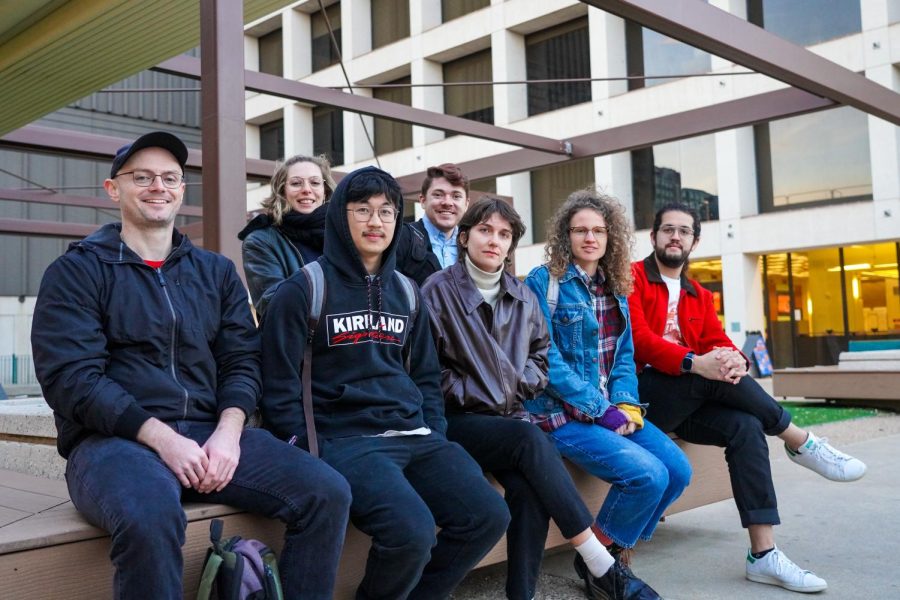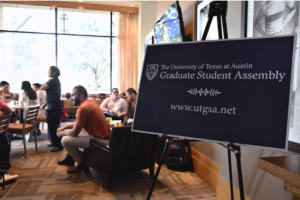Graduate students continue fight for better wages despite pushback
Members of Underpaid@UT sit together in the CMA patio on Feb. 17, 2023. The organization wants to raise awareness of the difficulties graduate students experience and advocate for a pay increase.
February 20, 2023
When Lauren Nelson arrived at UT in 2017 she was making $13,000, the same amount she had been making at her service job prior to going to graduate school. Sharing a 400-square-foot apartment with her girlfriend, they encountered roach infestations and mysterious brown goo leaking between the floorboards.
But splitting $915 per month between the two of them that was all they could afford. Otherwise, Nelson doesn’t know how they would be able to make ends meet.
“It’s rough,” English graduate student Nelson said.
These issues are why Nelson joined Underpaid@UT, a student-led organization fighting for living wages and better working conditions for graduate students. Last semester, Underpaid joined a growing national movement of graduate students applying pressure on university administrators to increase their wages as the cost of living continues to skyrocket across the country, especially in Austin.
Their actions culminated in a “grade-in” protest at the end of the fall where graduate students graded final exams and projects in the provost’s office. This prompted UT administrators to say they would meet with organizers in the spring. Members said that hasn’t happened, and they doubt it will.
When it comes to taking direct action, graduate students are limited in their options. As state employees, they’re restricted from striking or stopping work, but experts said they still have options to advocate for themselves and build long-term change.
Currently, the base pay for graduate students sits at $19,000 per year, which is under 30% of the median family income in the city for a single household and is classified as “extremely low-income.”
Underpaid wants to increase graduate student stipends to $36,317, which would give them a living wage according to the Massachusetts Institute of Technology living wage calculator. They’re also joining efforts along with the Texas State Employees Union, which represents workers at UT, to raise all state employee wages by $10,000.
The group made this demand in a letter to Provost Sharon Wood where they also mentioned financial difficulties graduate students have been met with as a result of low wages reported in surveys taken by about 818 graduate students at the time.
The survey results revealed most graduate students are forced to dive into their savings, take out additional loans or work additional jobs to supplement their stipends. Most are forced to live paycheck to paycheck.
“The University hasn’t put any meaningful resources toward raising the minimum graduate student stipend in decades,” Nelson said. “So if there’s a large financial disparity or cost to getting all graduate students up to living wage, it’s because it was sort of so low for so long with very few adjustments.”
Fight with administration
In the fall, the organizing members of Underpaid@UT decided their first order of business for the semester was to begin escalating actions in an attempt to get the University to address their concerns, primarily insufficient stipends and issues regarding health insurance.
It began with banner drops across campus, with one banner placed between the intersection of McCombs and the University Teaching Center, reading “UT Works Because We Do”. Underpaid deemed this to be small-scale, something that would garner attention and build up to what they envisioned to be a rally sometime in the spring semester.
Nelson said almost immediately University administrators began interfering with their actions.
“When we were doing the banner drop, someone from the Dean of Students Office came out and started sort of inspecting our knots and telling us that we would have to take down the banner after two hours, which is not an official rule,” Nelson said. “The Dean of Students Office had their eye on us and didn’t want us to make too much noise.”
Nelson tried to rationalize the decisions by administrators and hoped they weren’t trying to silence them. But then a week before the planned grade-in, they received an email from the dean’s office.
Douglas Garrard, associate vice president for campus life and deputy dean of students, said he wanted to meet with Nelson to “discuss logistics of (their) event and to make sure (their) event goes as smoothly as possible.”
Nelson described it to be a “banal” email, but she had a bad feeling about the meeting. Not wanting to jump to conclusions, she and a few co-organizers met with Garrard, and their fears were proven to be true. She said Garrard threatened them with a police response if they held the grade-in and told them they were violating University rules. Nelson said it felt like administrators attempted everything they could to shut down the event.
Nelson and her co-organizers left the meeting feeling deflated, almost giving in to the University’s desires. But upon further reflection, they decided they wouldn’t succumb to what UT administrators wanted. The grade-in would continue, but some adjustments were made to the plan.
“It was sort of the administration showing their true colors, so we decided to use that,” Nelson said. “We sort of turned it into a mini-rally. We reached out to local representatives to speak, and we got them to come out. Some faculty came, which was really great.”
About 50 people attended the grade-in, with students and supporters standing outside the tower while graduate students remained in the lobby of the Life Science Library working and grading papers until 5 p.m. Along with refusing students from occupying the hall outside the Provost’s office, they barred the press from entering the main building at all, according to a report by the Austin American-Statesman.
The grade-in was a way for graduate students to bring attention to their demands, with the focal point being to receive a living wage.
Physics graduate student Deepesh Verma said the issue of being underpaid extends beyond graduate students, with non-tenured faculty and staff suffering from the same issues.
“There are all these groups of people on campus who were all suffering under the same circumstances,” Verma said. “We’re trying to come together so that we can advocate for ourselves as a collective.”
Verma said graduate students have the tenacity to push through the worst situations, and this fight is no exception to that.
“(This) is going to go on until graduate students get what they deserve,” Verma said. “Nothing is too good for an employee here at UT, and I think UT needs to recognize that.”
Limited options
As a right-to-work state, Texas places some constraints on Underpaid’s movement. Being public sector workers, the students aren’t afforded collective bargaining rights, meaning the University doesn’t have to bargain a new contract with them in “good faith.” And if they chose to strike, they could be fired or retaliated against under state law.
While it may appear that Underpaid is fighting a losing battle with their lack of bargaining rights coupled with the inability to strike, Tobias Higbie, faculty chair of labor studies and associate director of the University of California Los Angeles’ Institute for Research on Labor and Employment, said that’s not the case.
Despite strikes increasing in visibility in recent years, a vast majority of unions don’t go on strike, making strikes somewhat unusual. Although striking is a valuable tool, it’s not the only means to succeed.
“I went to school at the University of Illinois, at a time when, in Illinois, graduate employees had no collective bargaining rights,” Higbie said. “We organized anyway despite the lack of a legal framework, and we won a lot of stuff without ever having collective bargaining. And 10 years later, after I was gone, the union won recognition and collective bargaining, and now they’ve been bargaining contracts for many years.”
There are a variety of things that exist in lieu of striking, beginning with organizing people around a common set of grievances, much like what Underpaid has done with wages.
From there, unions have the ability to create petitions, organize demonstrations, reach out to the board of trustees and even appeal to individuals within the state legislature. Higbie said the key is to focus on winnable battles that would continue to advance the interests of graduate students, building a bigger, stronger movement for those to come.
“You might win some of those things,” Higbie said. “But it’s about building for the long term (and) improving the university for the next generations of students.”
On Nov. 14, about 48,000 academic workers within the University of California system went on strike for reasons similar to Underpaid’s demands: better pay and benefits. It was the largest strike in the history of higher education in the U.S., and after six weeks of striking, UC and workers were able to agree on contracts that would increase salaries by 20-23% beginning in fall 2023.
Stratton Georgoulis, a Ph.D. candidate in plant pathology at the University of California Davis, joined the strike with UC graduate students and workers last fall. He described the strike as long and tiring, but he said that it was inspiring to witness the community that formed during those six weeks. Workers across the school came together to advocate for themselves and were able to make more progress in the first couple weeks of the strike than in the entire year preceding it.
With there being similarities in the actions of University of California workers and Underpaid, Georgoulis said he would look into additional legal protection to see if withholding their labor would be an option for Underpaid. At this point, he said it’s necessary to force the University’s hand.
Georgoulis said he doesn’t expect any new goodwill from UT’s administration given the way it responded in the fall, just as he wouldn’t have expected any amount of goodwill from the administration at UC unless it’d had the credible threat of a strike to force its hand.
“It sounds to me like it’s time for graduate students at UT to escalate the issue,” Georgoulis said. “I think the next step would be the threat of a strike as something that they can pull over the administration’s head. UC would never have given into any of our demands unless we have this legally protected strike.”
Building for the future
The University said they received Underpaid’s letter in December and plan to respond during the spring semester. The University stated in an email that it “continue(s) to work with graduate programs across campus to ensure that salaries are competitive and address the rising cost of living in Austin.”
As of now, Underpaid has yet to hear anything from the University, and at this point, Nelson said she’s not sure if they will.
The University added that during the 2021-22 academic year, it invested $10.9 million dollars in recurring funds to support graduate students, which was “the largest increase in graduate student funding in the University’s history.” UT also said it’s building a new graduate student housing complex that will provide graduate students with more affordable housing options on campus.
Joseph Rojas, a second-year master’s student in Latin American studies, said the comments made by the University are misleading. While UT currently has about 7,500 student housing units, 90% of those units are for undergraduates, and there are 11,000 graduate students. This has made attempting to secure student housing through the University a virtually impossible feat for graduate students.
In regards to the $10.9 million investment, Rojas said it raised minimum stipends from $16,500 to $19,500, which is still well under the cost of living in Austin. This raise also was done at the expense of graduate students’ health insurance, which Rojas said caused the default health insurance to worsen.
Looking forward, Underpaid plans to attend Lobby Day at the Capitol on April 12 alongside the Texas State Employees Union, where they’ll be campaigning for a $10,000 increase for all state employees. Standing in solidarity with TSU while continuing to keep pressure on UT administration, they’re hoping this will be a step forward in getting some of their issues addressed.
However, most graduate students admit there’s still a lot more work to be done.
“I’ll never see a penny of any increase of stipends or benefits,” Rojas said. “Even if I’m not going to be here, a lot of my peers will be for two, three, four more years. And then any new people coming in. I don’t know them, but I want them to make enough money to live here without being stressed.”














